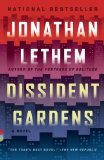Summary | Excerpt | Reviews | Beyond the Book | Readalikes | Genres & Themes | Author Bio

Critics' Opinion:
Readers' Opinion:
First Published:
Sep 2013, 384 pages
Paperback:
Jun 2014, 384 pages
 Book Reviewed by:
Book Reviewed by:
Poornima Apte
Buy This Book
The voice that crosscut through every room and situation, the voice never stilled, for once stilled.
If anything alarmed Miriam, it certainly would have been this: the absence of her mother's voice even when her mother paused in the doorway, on a trip bearing the unbearable ashtray from kitchen to parlor, and hovered there, stared at the girl with tight lips, possibly moist eyes though she'd have disclaimed this, then leaned to fondle her daughter's head, to mold her hand along the darling skull to the small hairs at the neck. Spoke not a word, most uncharacteristically, about the minefield of foil. Instead, still clutching the ashtray like a bludgeon, impulsively grabbed at one of the few remaining Mozartkugeln, bared it of wrapper, and grimacing, gobbled it whole, then stepped from the doorway still unspeaking, to return the ashtray to its place before any smoker's ash grew unsupportably long.
If the girl recalled it—unlikely—it would have been the sole instance in a lifetime that she'd seen a piece of German chocolate cross her mother's lips.
From that day it would be just the two of them, mother and daughter, in the Gardens apartment.
In Rose's constellation of memory, this was Ursa Major, the real trial. Something of which to be mordantly proud: that the top men in New York Communism had taken notice of Albert and decided he needed correction, needed to be adjusted, from the status of dissolute husband and father, a Commie lush conducting "meetings" at McSorley's tavern—where he'd been overheard by visiting undercover Soviets!—and pressed into service overseas. Returned to Germany, where his courtly manners made him an asset instead of a sore thumb. A dandy Jew with a trace of German accent tainting his English? Not of such terrific value to an American Communist Party looking to get folksy with the workers. A native German with impeccable English and total dedication, willing to repatriate? Of maximal attractiveness to the new society forming in the ragged shadows and rubble.
So Albert was sent to become an East German citizen and spy.
Rose could really savor the pomp and menace of the committee who'd come to Alma's little parlor to drink tea and put the seal on the destruction of her marriage. She could shroud herself properly in this memory, of the trial that had cost her everything, sent her slinking back to her candy-store peasant family to admit that no, you couldn't hold a man, couldn't, at last, keep that posh refugee. See? Rose's marriage, minus God, had flopped. And so she'd been cast into her life's purgatory: Real's Radish & Pickle, single-motherhood, and Queens without Manhattan, exile to that suburb of the enraged. And Albert Zimmer escaped back to Europe. What was Rose's failed marriage except evidence, against the whole fable of American history, that European chains could never be shrugged off?
#
And what, after all, were Albert Zimmer and Rose Angrush but an implausibility briefly entertained? Tolerated for an instant before being demolished, dismantled from at least three directions at once: her family, his family, and the party. The high assimilated German joining up with Rose the Polack, Rose the Russian, Rose the immigrant, second-generation Brooklyn Jew? Unlike every comedy ever devised by Jewish writers mocking class difference from the sanctuary of Hollywood, these were divisions that exactly couldn't be closed by the bonds of love. This wasn't screwball, it was you're screwed. Not It Happened One Night but It Happened Never.
How came it even to attempt happening?
Simple. At a packed meeting hall near Gramercy Park, under a high ornate ceiling echoing with voices, a mole met a mole. Rose seated there, on one side, in one creaky wooden folding chair; Albert seated here, across the room, in the same sort of chair. Both seeking to take the meeting's floor, to steer its innocence and idealism in a given direction, both eager to run back to their contacts and brag of enlisting the group, and both obstructed, largely, by the other. Oh, it was ripe: Albert and Rose discovered each other because they'd been assigned, by their separate and poorly coordinated cells, to insinuate themselves into the same organization, the Gramercy Park Young People's League. To introduce the possibility of solidarity with the coming workers' revolution into this vague, well-intentioned gathering.
Excerpted from Dissident Gardens by Jonathan Lethem. Copyright © 2013 by Jonathan Lethem. Excerpted by permission of Doubleday. All rights reserved. No part of this excerpt may be reproduced or reprinted without permission in writing from the publisher.





The House on Biscayne Bay
by Chanel Cleeton
As death stalks a gothic mansion in Miami, the lives of two women intertwine as the past and present collide.

The Flower Sisters
by Michelle Collins Anderson
From the new Fannie Flagg of the Ozarks, a richly-woven story of family, forgiveness, and reinvention.

The Funeral Cryer by Wenyan Lu
Debut novelist Wenyan Lu brings us this witty yet profound story about one woman's midlife reawakening in contemporary rural China.
Your guide toexceptional books
BookBrowse seeks out and recommends the best in contemporary fiction and nonfiction—books that not only engage and entertain but also deepen our understanding of ourselves and the world around us.